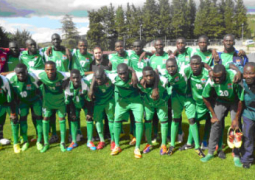Speaking at the sites, both Sariyang Jobarteh, Deputy Director General of Agriculture, Amie Fabureh, Deputy Director of Horticulture and Dr. Perpetua Katepa Kalala, FAO Country Representative acknowledged the fruitful partnership between the Department of Agriculture (DoA) and FAO in the implementation of the project. They praised the EU for funding the project. They enjoined the communities to take ownership of the gardens (which have been fenced, equipped with solar powered bore holes with ground tanks, watering cans and other garden tools in addition to the seeds and fertilizers and trainings given to them by the project) and work hard. They also advised them to utilize the water wisely and to continue practicing the Good Agricultural Practices (GAPs) they have been trained in by the (DoA) and MDG1c Project field staff and to put in place viable sustainability mechanisms for the attainment of the desired objectives. Madam Kalala told the beneficiaries that the government, EU and FAO have played their part and the onus now lies on the communities to put the gardens to good use. ‘‘It is your responsibility to manage your revolving funds well and to ensure that you are able to generate more income to sustain the garden equipment independently. If you work hard, your children and grandchildren should be farming in these gardens. FAO is only complementing government`s efforts. DoA and FAO will give you all the necessary support within the remaining six months of the project cycle for you to put in place a viable sustainability plan’’, she noted.
Speaking at Konteh Kunda Niji, Alasan Bah, Regional Agriculture Director for NBR lamented that GAPs are often abandoned by communities once projects have phased out. He appealed to both farmers and agriculture extensionists to sustain the practice of GAPs even after the end of the project while restated his directorate`s continues support to the initiative.
The team also visited the Wellingara Tidal Irrigation Scheme in CRR South, where some 9 km of irrigation canals were de-silted by the project in 2015. The farmers praised the project for the intervention noting that it has helped them to be able to cultivate several plots some of which were uncultivable for more than five years due to lack of water. Speaking at the site, Ousman Colley, Regional Agriculture Director for CRR South appealed for the de-silting of an additional 4.6km at the site to improve access to water. He urged farmers to keep their canals clean at all times to prevent blockage.
Speaking at Sutukung, Ansumana Njie,Regional Agriculture Director for LRR also spoke of the need for efficient water usage. Momodou Mbye Jabang, Coordinator, Central Projects Coordinating Unit, Ministry of Agriculture lauded the EU and FAO for the intervention. He promised that the technical support being provided by the project staff will be continued by DoA after the project has phased out to ensure the attainment of the desired objectives.
Responding to the communities` appeal for support to ease access to markets, Mr. Jabang disclosed that the main feeder road linking Sutukung, Barrow kunda and Bureng to the Soma-Basse Highway will be rehabilitated by the FASDEP Project. The news was received with joy by the community.
The district chief and the National Assembly for the Area Ansumana Kanagi and Hon. Bafaye Saidykhan respectively, explained that the poor road network has been a huge obstacle towards the achievement of development gaols.
They expressed gratitude to government, the EU and FAO for the MDG1c project, noting that it has improved food and nutrition security, income and wellbeing in the area. They used the opportunity to appeal for the intervention to be extended to other parts of the district. Chief Kanagi who has 4 beds of onions at the Sutukung garden has promised that the site would be sustained for posterity.




